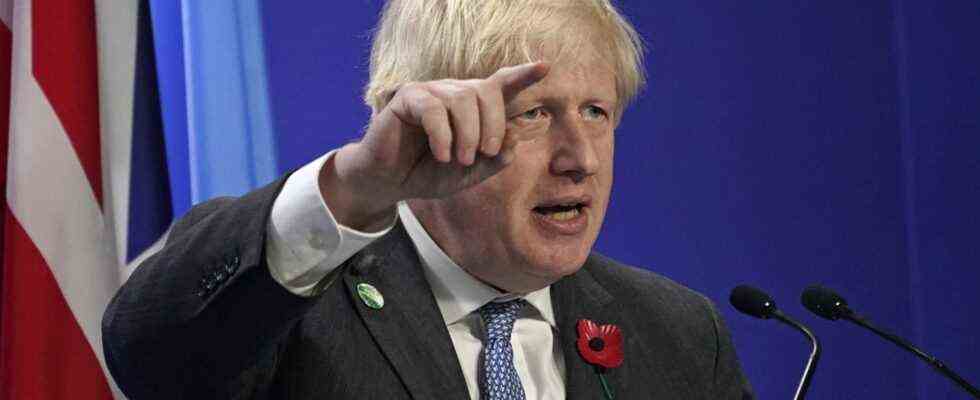Status: 07.11.2021 10:29 a.m.
For a week now, measures to achieve global climate goals have been struggling in Glasgow. For the second week of the World Climate Conference, British Prime Minister Johnson expects tough negotiations again – and calls for results.
After the first week of the world climate conference COP26 in Glasgow, the British Prime Minister Boris Johnson called for more ambition in the negotiations. “The COP26 still has a week to deliver for the world, we all have to pull together and head for the finish line,” said the summit host in London.
There had been “pledges to reduce carbon and methane emissions, end deforestation, phase out coal and provide more funding for the countries hardest hit by climate change.” “But we mustn’t underestimate the task of keeping the 1.5-degree goal alive,” said Johnson. “Countries must return to the negotiating table this week and be ready to make the bold compromises and ambitious commitments required,” he said.
For two weeks, representatives from around 200 nations negotiate in Glasgow about how the climate targets set in Paris in 2015 are to be achieved and specifically implemented. The states’ previous plans are nowhere near sufficient for this.
Some states are announcing more ambitious climate targets
Since the beginning of COP26, a number of countries have tightened their national climate protection targets. In particular, the announcement of India, an important country due to its population size, had been eagerly awaited. New Delhi finally announced that it would strive for climate neutrality, but not until 2070. Around one hundred countries have also committed to reducing their emissions of the important greenhouse gas methane by 30 percent by 2030. Climate activists complain in particular that major methane emitters such as China, India, Russia and Australia did not join the declaration.
Dispute over payments to poorer countries
The question of climate aid for poorer countries had already caused displeasure at COP26 in advance. The industrialized nations had admitted that they would only achieve the promise they made in 2009 to provide $ 100 billion in support annually from 2020 onwards. The poorer countries are urgently demanding more money, pointing out that the industrialized countries are responsible for the overwhelming majority of greenhouse gas emissions in the past few decades. This dispute is likely to be significant in the second week of COP26.
Environmental groups and development organizations criticized the faltering support. They advocate that rich countries drastically increase their climate aid for poor countries. Greenpeace boss Jennifer Morgan put the financial needs of the less developed countries at several trillion. This is the only way for the global south to adapt to the fatal consequences of global warming, such as more and more droughts and floods, and also to reduce climate-damaging greenhouse gases. The Oxfam organization’s climate expert, Nafkote Dabi, blamed the industrialized countries as the originators of the climate crisis. Poor countries suffered the most. This injustice must be redressed. She also denounced ecological vandalism, especially by the “super-rich”, whose per capita emissions of greenhouse gases are far higher than that of the rest of humanity.
The UN refugee agency UNHCR also called for more help for countries particularly affected by climate change. Most of the world’s refugees come from these countries or find refuge in countries that are themselves suffering from climate change, said the United Nations Commissioner for Refugees, Filippo Grandi. Disasters such as floods, droughts and desertification destroyed livelihoods, fueled conflicts and forced people to flee, Grandi said. More financial support from the richest and political will are needed. According to UNHCR’s climate commissioner Andrew Harper, 90 percent of refugees come under a UN mandate and 70 percent of all internally displaced people come from countries that are least equipped to deal with climate change.
Johnson: “Everyone must agree”
At the end of the day there should be a joint declaration by all countries, which, among other things, clarifies unresolved issues of the Paris Agreement. In addition to financing issues, there are controversial issues about procedures and standards for monitoring whether and how the countries are keeping their climate commitments.
“Everyone has to agree, otherwise there will be no agreement,” said Johnson. Despite all the warnings, he was nevertheless confident about the further course of the negotiations: “The progress made in the first week of the COP has put us in a strong position,” said the prime minister.
Opposition British Labor politician Ed Miliband is less optimistic. He urged Johnson to take the helm himself and move the negotiations forward. They are still very far from being able to say that great steps have been taken to keep the 1.5 degree target within the realms of possibility. Researchers expect catastrophic consequences if the planet warms up.

